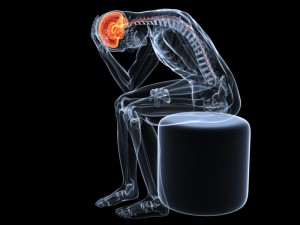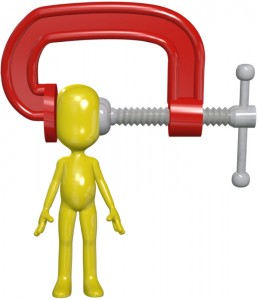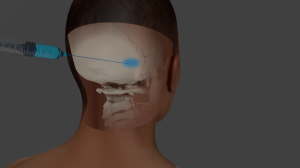What is an occipital nerve block (ONB)?
An occipital nerve block is the injection of corticosteroid with or without a local anesthetic to the area of the greater and lesser occipital nerves which are located at the base of the skull just above the neck. Relief of headache pain following the injection implies that  irritation of one or both of these nerves was responsible for the headache.
irritation of one or both of these nerves was responsible for the headache.
Headaches that respond well to occipital nerve blocks
Occipital neuralgia is a clear indication for an ONB. Occipital neuralgia is a condition where the occipital nerves are inflamed or injured. Pain is perceived as aching, burning or throbbing on one or both sides of the head. The symptoms can be very similar to that of migraine or other types of headache. By definition, the headache associated with occipital neuralgia is reproduced with pre ssure over the occipital nerves and there is tenderness to palpation of the nerves.
ssure over the occipital nerves and there is tenderness to palpation of the nerves.
Cluster headaches have been clinically proven to respond well to ONBs [1]. Most studies indicate that the cluster headache need not be reproduced with pressure over the occipital nerve and tenderness of the occipital nerve to palpation is not necessary when selecting patients with cluster headache for treatment with occipital nerve blocks.
Cervicogenic headaches are responsive to ONBs. A cervicogenic headache is referred pain in the head from a source in the neck. Any painful stimulus arising from the upper cervical joint structures can be transmitted to the trigeminocervical nucleus and can thus produce headache. Cervicogenic headaches are characteristically one-sided and aggravated by certain neck movements or postures.
Migraine headaches do respond to the use of ONBs according to the results of observational studies. However, no randomized controlled studies have been published to confirm the benefit of ONBs for migraine.
Headaches that do not respond well to occipital nerve blocks
Occipital nerve blocks have not been effective in treating “medication overuse” headaches, tension headaches or post-traumatic headaches. Medication overuse headaches (also called rebound headaches) occur when painkillers are taken frequently to control  headaches.
headaches.
Patients with an underlying headache disorder such as migraine or tension-type headache who self-medicate their headaches frequently are susceptible to medication overuse headache. Their headaches are thus transformed from an episodic condition to a chronic daily headache.
Tension headaches (due to muscle contraction) may respond to ONBs if the headache can be reproduced with occipital nerve pressure or if there is tenderness to palpation of the occipital nerve.






Leave A Comment